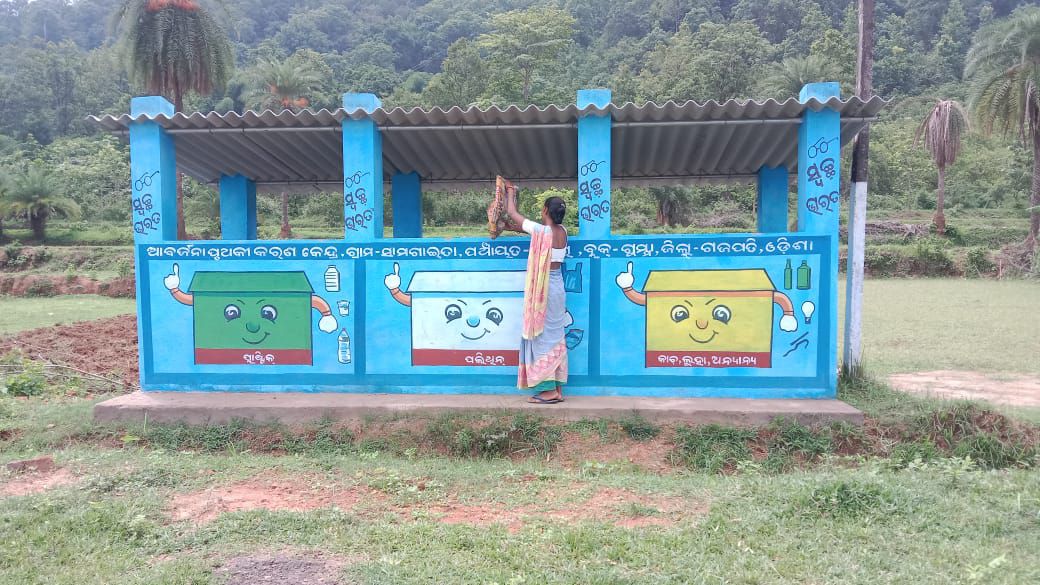Communities make efforts to set-up a sustainable waste management centre in the village
StoryBy Chandrika Patnaik
25 January 2023
Rural communities strive to keep their villages clean and safe through an efficient solid waste management system.

A common dustbin in Samogaita village in Tarava Gram Panchayat of Gajapati district.
Photograph by Banabasi Patnaik
“To achieve a clean Panchayat, all the villages under our Panchayat should implement solid waste disposal systems. Let us start with village-level waste disposal through awareness meetings educating the community on biodegradable wastes, non-biodegradable wastes and what are hazardous wastes with different segments of people/groups in the village like households, SHGs, tea stalls, shopkeepers, and school children. The next step would be to make them understand how to do segregation from the household level,” says Joseph Gamango, Panchayat Executive Officer (PEO) of Tarava Gram Panchayat in Gajapati district during a felicitation ceremony of the newly elected PRI members in the Tarava community hall.
After formation of a Village Development Committee in Samagaitha village in Tarava Panchayat in April 2022, Gram Vikas introduced its plans to engage the local community in water resource management and to build sustainable and gender-equitable institutions for long term sustainability of interventions.
The village committee and SHG members of Samagaita village, met to discuss waste piling on their streets and scaling up waste management in their village following the Panchayat meeting in Tarava. The focus was on first bringing about behavioural change to eliminate the littering of waste in open areas and scaling it up through a participatory approach for implementing a community waste management programme in the village. They decided to mobilise the residents through SHG meetings and village meetings.
In the following days, the village witnessed awareness sessions with SHG members on waste disposal and the benefits of living in a clean environment. The SHG members made placards and carried them around in the village to spread awareness. The SHG and village committee members discussed the health benefits of safely disposing waste that would otherwise contaminate the environment. They also discussed the economic benefits of recycling waste products. Dumping waste in the open can contaminate the soil and groundwater, and become a breeding ground for flies, rats, and other insects.
The awareness sessions helped the community understand the difference in solid and liquid waste based on usage. Rispa Gamango, 25, of Janani SHG, says: “When dustbins at homes get filled up, they get thrown out on the sides of streets and open ground. But having a place exclusively to dump waste will ensure cleanliness in the environment.” After a village meeting, forty-five households from the village agreed to set up a waste management system. The village approached the Naib Sarpanch with a request for funds to build a waste disposal centre. The Naib Sarpanch released the funds for the construction of the centre the following week.
The residents of Samaghaita feel a sense of pride in having a community waste disposal centre. This is quite evident when residents from other villages, such as from neighbouring Ukhura Panchayat, notice the disposal centre on the side of the main road while passing by and enquire about it. Tibati Gamango, 32, of Janani SHG, says: “The residents from Maliar and Minjri, villages in the Ukhura Gram Panchayat, visited the disposal centre in Samagaitha. We explained to them the benefits of having a waste management system and how to approach the Panchayat for funds to build a community bin in their village. After talking to us, both villages approached their Sarpanch and have received funds to build a community bin in their village.”
A waste sorting centre in Chamakhandi Gram Panchayat of Ganjam district.
Photograph by Manikamala Swain
ACKNOWLEDGEMENT
Manikamala Swain, Thematic Coordinator, Planning Monitoring Documentation and Communication; Banabasi Patnaik, Thematic Coordinator, Village Institutions; and Ranjit Kumar Dutta, Thematic Coordinator, Sanitation and Health, helped with data collection for the story. Mark Lancy Sebastian edited the story.
ABOUT THE AUTHOR
Chandrika Patnaik leads content production within the Communications team in Gram Vikas.
RELATED BLOGPOSTS
Turning losses into gains: How Mallipanka farmers find success in new crops
Reviving agriculture: Mallipanka’s first strawberry farm story.
Ensuring dignity beyond life: supporting migrant families in their darkest hours
Gram Vikas ensures safe migration and dignified repatriation for deceased migrant workers, supporting bereaved families.
Collective leadership transforms ageing overhead water tank to secure household water supply for all
Kalakhadi’s aging overhead tank revived through collective leadership, ensuring sustainable water supply for the community.